Work starts on new Royal Preston Hospital ‘surge hub’ as pressure across the Lancashire region increases
and live on Freeview channel 276
With their hospitals currently under ever increasing pressure due to the spread of Omicron, Lancashire Teaching Hospitals Trust are taking extra precautionary steps to ensure the situation does not worsen.
Although Lancashire has not declared an emergency incident like its neighbouring hospital trusts in Morecambe Bay and Blackpool, the CEO, Kevin McGee explains that the situation is still difficult, which is why precautionary measures need to be in place to ensure this remains the case.
Advertisement
Hide AdAdvertisement
Hide AdWith Royal Preston Hospital in mind, Kevin said: "I'm hopeful that we won't have to declare an incident but I have to say that we are incredibly busy- it's the busiest I've known the NHS at this period of year.
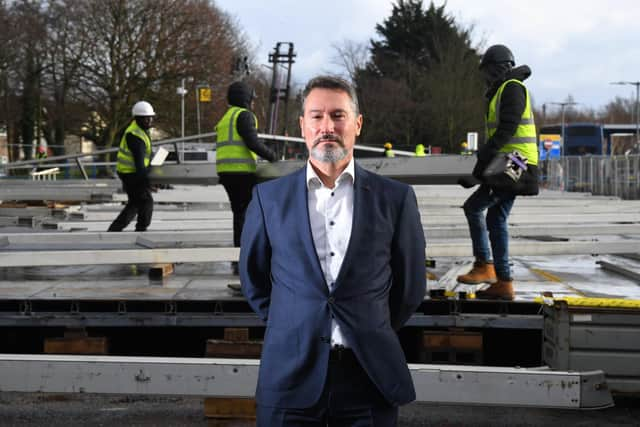

"The first couple of weeks in January are always our busiest time of the year ... but on top of that, we've got two other things which are causing an immense pressure. Firstly, we've got, as of today, approximately 120 patients in our beds with COVID, so that's 4-5 wards completely taken out with COVID patients. And in addition to that, we've got significant staff sickness as well, so our sickness levels are running at about 10%, that's double what would normally be for this time of year, and again, that's COVID related."
Kevin adds that although the hospital is "coping" for the moment, Covid transmission in Lancashire is projected to go up for the next few weeks, so with hospital admissions expected to increase, the Trust is anxious to ensure services do not become overwhelmed.
As part of this, work has started on a new nightingale surge hub at RPH this week, a temporary hospital structure built on one of the hospital’s car parks, which will provide 100 extra bed spaces if more capacity is needed.
Advertisement
Hide AdAdvertisement
Hide AdKnown as a ‘surge step down ward’, the hub is for ex-coronavirus patients from Preston, as well as other local hospitals, who are now in recovery but are unable to be discharged yet.
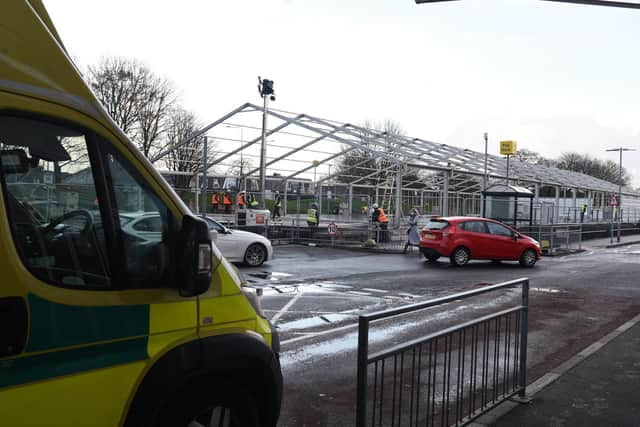

Kevin said: “My hope is that we never have to use it. We're planning for it, and that's quite right because we need to make sure that we put the appropriate capacity in place should we need it, but I'm hopeful we can manage within our core bed base.”
In preparation for a surge, the hospital's restaurant and two physio gyms are also currently under renovation, ensuring that they can become back-up wards if needed.
The restaurant, which will retain its current function until called upon, will be able to house 30 beds, whilst each gym houses 10.
Advertisement
Hide AdAdvertisement
Hide AdThe Trust is also hoping to expand its use of virtual services in order to preserve bed space; this involves closely monitoring certain patients outside of hospitals, in their own homes, however, if their position deteriorates, they could then be moved very quickly into a hospital bed.
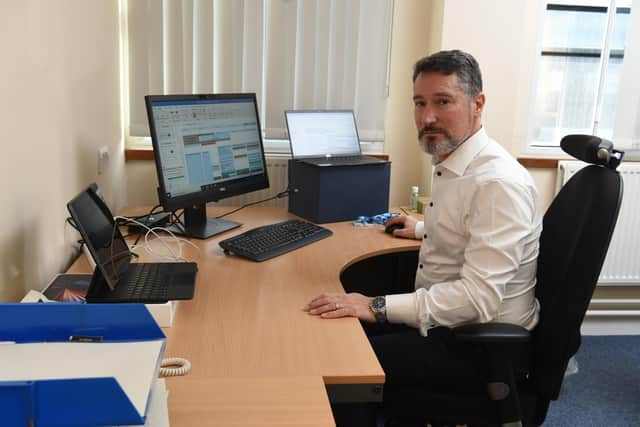

Although these measures are only if the Omicron surge worsens, the hospital’s respiratory ward especially highlights why the Trust needs to be cautious- it is currently at full capacity, with all of it’s 34 beds being occupied by Coronavirus patients.
Professor Mohammed Munavvar, a consultant respiratory physician at Royal Preston Hospital explained: “At the moment, the entire ward has been taken over by Covid patients, so in a sense, we do not have space for non Covid respiratory patients- that's the reality because the hospital itself is full of Covid patients now.
"About three weeks ago, we had only about 30 to 40 patients, and then after the Christmas period, there was a dramatic increase, a tripling of the numbers, so we crossed 100, and now we've got about 113 patients on a daily basis, with another 20 awaiting results.
Advertisement
Hide AdAdvertisement
Hide Ad"The fact that Covid patients are increasingly getting admitted, means they are stretching the system but it also means that non Covid patients, with other medical problems cannot be treated by us. The other challenge is that a number of colleagues are getting infected because it's highly transmissible, and therefore we are struggling to ensure that we have safe staffing, absence levels on our ward average at 20-30% but at its peak at Christmas it was nearer 50%."
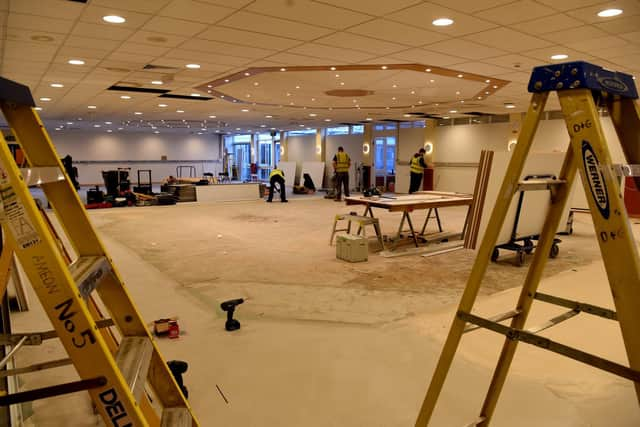

Professor Munavvar, who was the first staff member to detect Covid in the RPH in March 2020, and the first to suffer from it himself, says there are many ways that the public can help ease the pressure on staff, in light of rising cases.
He explained: "The best thing that people can do to help us is to get vaccinated, get the boosters, and then continue to take all possible precautions, masking, social distancing, hand washing, etc.
"People who are at the severe end of the spectrum, requiring very high flow oxygen, requiring ventilation, are those who have not been vaccinated or are incompletely vaccinated. Those who have been vaccinated and boosted do come in but often for other reasons, and then they recover very quickly.
Advertisement
Hide AdAdvertisement
Hide Ad“Interestingly, the majority of the people who are coming in unvaccinated, are not against the vaccine, it's just that they didn't get around to it, and often, they say that they believed that they are so fit and well that they won't become seriously ill with Covid, so why bother, but once they come in, they're actually shocked to see how seriously ill they become, very severely short of breath, desperate to get better, they hold our hand and say, please do get us through this, and unfortunately, with some of them, it's not easy because their oxygen levels plummet, their lungs fill with severe pneumonitis and we have to rush them to critical care, and some very sadly, do not make it at all.”
The Trust's CEOK agrees that whilst the NHS is doing the best it can to handle the situation, the public can help ease the pressure too.
Kevin said: “The most obvious thing is to say to everybody again, and again, please get your vaccinations, it's not too late and that's the most important thing that anybody can do to protect themselves, their family, their loved ones and their communities.
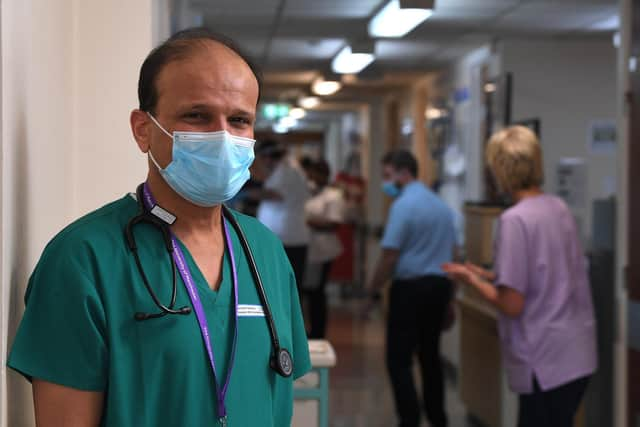

"And then the other thing that I would really try and push is that we are looking to discharge patients safely, but as quickly as possible, so when patients are going to be discharged, if the relatives can come as early as they can in the day to pick them up, that means that bed is free for somebody else on a quicker basis.
Advertisement
Hide AdAdvertisement
Hide Ad"I've worked in the NHS now for 35 years, this is the most pressurised position that I've experienced, but what I'm absolutely confident about, with the staff that we've got, how staff are working, the planning that we've done, is that we will get through this period, and we will start to plan for the restoration of activity and reduction of our waiting lists, but this has to be a joint effort between ourselves and our communities."